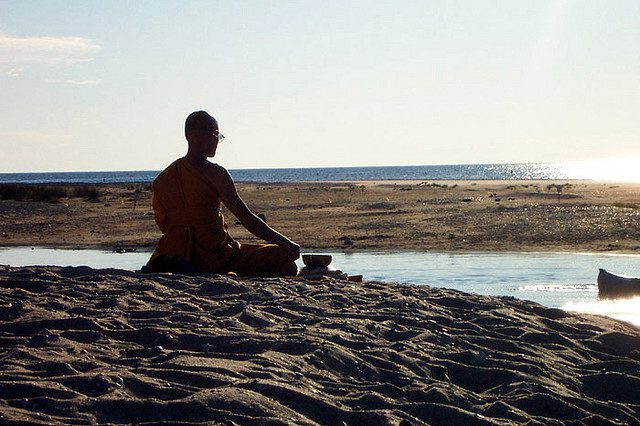In case you’ve been living under a rock, mindfulness is all the rage these days. Since January I have filed away nearly every story on or popular mention of ‘mindfulness’ that crossed my path. At current, I’m at 43 links and I’m certain it’s just a drop in the bucket of what’s out there. I have a lawyer in Florida explaining “Mindfulness: What it is and how it helps” a Cosmopolitan article explaining (above a picture of Jennifer Aniston):
Jo Usmar, Cosmo’s ex-Sex and the Not So Single Girl, has two more self-help books coming out: This Book Will Make You Mindful and This Book Will Make You Feel Beautiful. As she’s clearly an oracle of feel-good knowledge we got her to explain what mindfulness is and how you can get some.
And then there was BBC Radio’s Podcast, “Meditation: Panacea or Fad?” in which the presenter Emma Barnett tries to meditate a couple times and then concludes that she’d prefer a walk or glass of whiskey with friends (the podcast is commendable, however, for the many interviews included). Those come from the first half of January. Then there are the more recent, Mind your Own Business by Barbara Ehrenreich, critiquing the smell of Silicon Valley that permeates so much of the business end of mindfulness these days; Mindful Responds to New York Times’ “The Muddied Meaning of Mindfulness”, which offers this commonly heard defense of teaching mindfulness in its various forms to anyone and everyone:
The point of introducing mindfulness on the job is not to foster a compliant workforce. It is to help people become more self-aware and able to discern how their workplace efforts—in schools, hospitals, other public institutions, and businesses of all kinds—can contribute to a better life for them, a better organization, and a better society overall. To check that out, ask some people who have been trained in mindfulness in the workplace. It’s not brainwashing.
There is also Who gets Mindfulness ‘Right’? An Engaged Buddhist Perspective, by Edwin Ng; an excellent piece from Australia. In it, Ng adds to the above advice, “As Bhikkhu Bodhi has explained, the adaptations of mindfulness in therapeutic, rehabilitative, or even business settings are to be commended if they can help the individual develop greater wellbeing.” “But,” Ng continues, “Bhikkhu Bodhi is also an advocate of engaged Buddhism. His concerns about how clarifying the guiding principles of mindfulness invite us to take pause to reflect carefully on the broader ethical and political stakes involved in the commodifying and institutionalising trend.”

As I wrote in Mindfulness: Critics and Defenders back in 2013, Bhikkhu Bodhi isn’t the only one worried about the ethical and political ramifications of ‘mainstreaming‘ mindfulness. Christopher Titmus, another well-known meditation teacher and writer, wrote in The Buddha of Mindfulness. A Stress Destruction Programme that mindfulness, or “paying of attention to the present moment in a non-judgemental way” simply “leaves individuals in the company grappling with their stress while ignoring the larger picture of corporate politics…” And Ron Purser and David Loy, whose 2013 article in the Huffington Post, “Beyond McMindfulness” spurred much of my interest in the topic, worried there that the ‘shadow’ of mainstreamed mindfulness would include the stripping of mindfulness from its (Buddhist) ethical foundations which would simply allow it to be used to reinforce greed, aversion, and delusion (the three roots of suffering that Buddhists seek to eliminate). In Mindfulness: Critics and Defenders I summarized or drew comments from a number of scholars, teachers, and writers (Buddhist and non-) who have become interested in this debate. And many of them continue to actively engage in discussions precisely around this topic of ethics in the teaching of mindfulness. In following and taking part in this conversation, I have always found a great deal of wisdom in the concerns and points on ‘both sides’ (which is an oversimplification, because one could better talk of a ‘spectrum’ or ‘spectrums’ of views).
~
But yesterday Tricycle published an article by Richard K. Payne somewhat dismissively subtitled “The misguided debate about mindfulness and morality.” That could, of course, be a misguided choice of words by an editor, but what follows in the article seems to bear out the sense that Dr. Payne really does think the whole discussion is missing the point. He writes:
Underlying the discussion of ethics in mindfulness, however, is the presumption that there exists an inherent relation between religion and morality. Yet this focus on morality—thought to define the practice as religious rather than secular, Buddhist rather than non-Buddhist—is based on Western presumptions about religion inherited from Christianity, not Buddhism.
The last line, that this focus on morality, “is based on Western presumptions about religion inherited from Christianity, not Buddhism” is the difficult part. Payne will go on to say more about this, but first he offers a helpful typology of claims about the relationship between ethics and mindfulness practice: inherent, integral, and modular. This typology itself is excellent, and I hope that I or others engaging in this discussion can take it up and see how it moves the conversation forward. However, Payne continues:
But the fundamental ground of each of these positions—the way in which Western culture conceives of religion—has been ignored. That conception is built on a basic narrative trajectory that leads from primal, blissful harmony in Paradise, through sinful disobedience and ejection from Paradise, to a final atonement and reconciliation.
To begin, there are many Western cultural conceptions of religion today and one could argue that the strongest of them are Darwinian, or at least secular (Marxist, pscyhoanalytic, etc) in nature. Certainly within the mostly very educated circles where the mindfulness discussion has taken place, the biblical narrative discussed here wasn’t grounding many (if any at all) positions. He goes on:
This biblical narrative is fundamentally ethical in nature, hinging as it does on sinful action as the cause for the fall from grace. Many in the Western Buddhist communities have absorbed this cultural identification of religion with morality uncritically and perhaps unconsciously. It is, after all, an assumption so well established as to be invisible to us.
Yes, the biblical narrative is ethical in nature; but Buddhist narratives such as the Jataka tails and the Aggañña Sutta are ethical too. Yes, too, many Western Buddhists may live more by a biblical moral narrative than a Buddhist one (one only needs to think of the earnestness of some young Buddhists in their insistence that you must believe in karma or rebirth to be a good Buddhist). But again, I’m not sure – and Payne gives little to nothing in terms of evidence here – that this applies to the people involved in the discussion of morality and mindfulness.
But Payne does suggest that the Buddhist narrative takes a “different trajectory” in which ethics is “preliminary,” not regarded as a “strong moral imperative to improve oneself” which is a product of “Protestant religious culture.”
Here Payne is drifting into contestable scholarly territory with Buddhist ethics. Certainly a version of the path is given as “morality, meditation, and wisdom (sila, samadhi, prajna)” where, perhaps, “[t]he order is not incidental…” as he states, but the path is also stated in various other formulations, notably the 8-fold path where portions associated with wisdom are first, followed by ethics and finally meditation. We also read in the Sondadanda Sutta: The Qualities of a True Brahmin, that “Just as one hand washes the other, or one foot the other, so wisdom is purified by morality and morality is purified by wisdom.”
Morality is so deeply ingrained in the Buddhist narrative that it is said to be like one hand, while wisdom is the other. No hierarchy here, but rather a deep interbeing (if I can borrow a neologism from Thich Nhat Hanh). Sila, or ethics, is also central to the lives of most Buddhists throughout Asia historically and today. So much so that for many Buddhists, ethical practices such as generosity to the sangha and honesty in daily life form the beginning and end of their practice, with hopes of simply gaining a higher rebirth in the next life. One could say this is their very Buddhist drive for self-improvement
So why does Dr. Payne think that the worries about chopping off ethics must come from Protestantism or current Western cultural issues around self improvement?
My impression, after discussing this topic with serious practitioners and scholars for the last couple years, including many of those named above and in Mindfulness: Critics and Defenders, is that the worries about ethics come from people with great acquaintance with, understanding of, and devotion to Buddhist traditions. Payne concludes, in part, by suggesting that, “highlighting the contradictions between the cultural presumptions that regard morality as the key to salvation and morality’s role within the Buddhist framework might challenge participants in the debate to question why it has become such a hot-button issue.”
Given the understanding of morality being on par with wisdom as key to Buddhist awakening in the Pali sources and the likely, if not certain, continued importance of ethics in Buddhist traditions, I think it is clear why attempts to separate mindfulness teaching from ethics has become a hot-button issue.
There may be good claims to be made about Protestantism or other Western presumptions underlying various discussions of Buddhism today. But the debate about ethics is not one of those areas.












